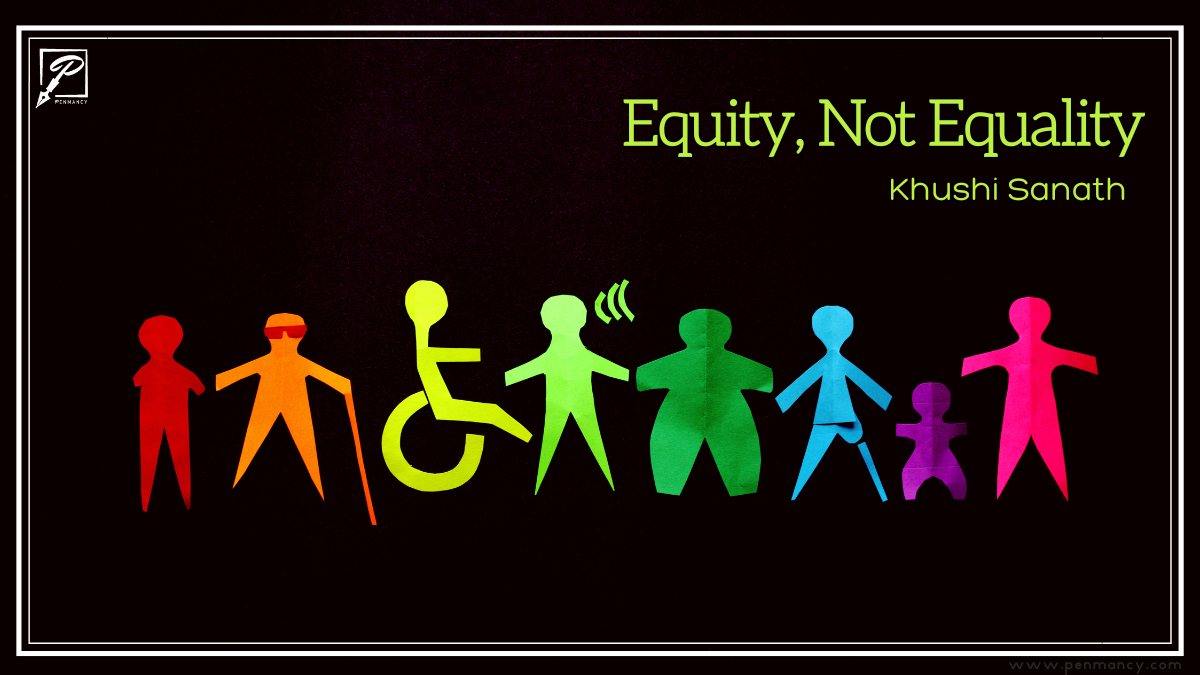
I am not a feminist and I don’t believe in equality.
I know this statement ruffles a few feathers but I can explain.
What I understand from the term ‘feminist’ is a person who supports the idea of women having equal opportunities as men. Believing in the idea that men and women are equals. This is where I have an issue.
I don’t believe that men and women are equal because they are biologically different. Both men and women have different sets of abilities and shortcomings and when two entities are fundamentally different, you cannot possibly compare them.
There is a simple solution to this and it can be explained with a rudimentary concept of mathematics. Do you remember how we used to compare improper fractions (fractions with different denominators) in our 3rd grade? We would make the denominators equal to compare the fractions fairly. This is exactly what we need to do in our society.
To do this, we need to change the word ‘equality’ with ‘equity’ in our definition of feminism.
For women to succeed, it is not enough to give them the same opportunities as men. Instead, as a society, we first have to prop up women with the privileges that men have and then provide them with equal opportunities.
Marriage, childbirth, menstrual cycles, biological clock, and parenting are the pile of miseries that avalanches over women and slowly get the better of them.
Recently, I was telling my grandfather that I eyed the corporate world and that I was considering management for my postgrad. As a reply, he brusquely said that it would be better if I did my Mtech and became a professor as it was a better-suited job for a girl. This irked me. But in retrospect, what he said is not entirely wrong. The corporate world isn’t designed for women. As cliché, as it may sound, in the cutthroat, competitive corporate world, it is usually the woman who has to choose between work and family.
Former CEO of PepsiCo, Indra Nooyi, in her autobiography, mentioned how one of her bosses offered her 6 months of paid leave so that she could take care of her ailing father. She said that because of this generous gesture, she didn’t have to compromise on her career by quitting, to fulfill her family commitments.
This case, however, is like a pin in a haystack. What about the millions of Indras who could have brought immense fame to our country but couldn’t because of family constraints?
I recently watched a TED Talk on a similar topic where the erudite speaker shared an anecdote. It was about how her housemaid’s brainy daughter chose marriage over education because she was convinced that she didn’t have it in her to secure a seat.
Isn’t this an evocative reflection of our country’s mentality? To a country that is so concerned about increased ‘brain drain,’ I ask, what are we doing to protect the existing brains in our country? Don’t such instances portend a greater doom of the same ilk? Shouldn’t we be more concerned about these beautiful minds that get effaced before they can prove themselves?
However, equity is subjective and it should be implemented judicially.
For instance, recently in the parliament, when questioned about monthly menstrual leave for women, a prominent figure, intrepidly replied that menstruation is not a “handicap.”
Menstruation doesn’t entitle you to a five-day monthly hiatus. Implementing such norms could pose more trouble than good. It could go either of two ways- it could be misused or women could start getting harassed at workplaces for having extra leaves. Like we have heard of students getting brutally ragged for having entered the college via caste reservation.
In a nutshell, providing reservations in colleges and jobs and formulating laws for the protection of women isn’t enough to bring about gender parity.
Steps that can make a mammoth difference are as follows:
- Extending the age group of the Maternity Benefit (Amendment) Act, 2017 (it requires every establishment having fifty or more employees to have the facility of crèche within a prescribed distance) to kids of 6 months to 12 years. (According to the National Library of Medicine, the period for greatest impact of parenting on a child's development occurs at adolescence, at a median age of 12 years.) This will slightly reduce the stress of parenting on women.
- Giving men an extra month of paternity leave during their wife’s last month of maternity leave. So, the father is a little more involved in parenting. This will help the mother to slowly loosen the reins of motherhood and tighten her grip over her career, by getting things in order before resuming work.
- Encouraging female employees to take up small courses during maternity leave. This has two benefits-
1. It will be like an upskill for the job.
2. It will encourage the new mother to make time for herself, away from the family conundrum. This may also have a sanguine impact on post-partum depression as learning new things acts as a mental exercise.
- Organizing regular ‘bring your kids to work’ days for fathers with a didactic motive to make them more involved in parenting. This would again reduce the stress on women.
This will unequivocally ensure equity and maybe then we can talk about comparison between men and unfettered women in a supposedly equal world. These changes will increase the chances of women enjoying the best of both worlds. Because for women family and kids are like the ‘delicious burdens’ that Walt Whitman mentions in his poem ‘Song of the Open Road’
Still here I carry my old delicious burdens,
I carry them, men and women, I carry them with me wherever I go,
I swear it is impossible for me to get rid of them,
I am fill’d with them, and I will fill them in return.
